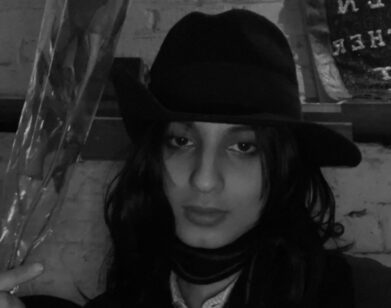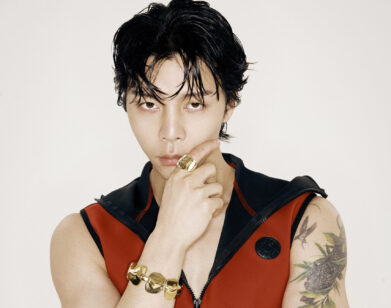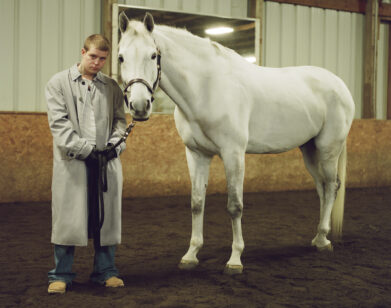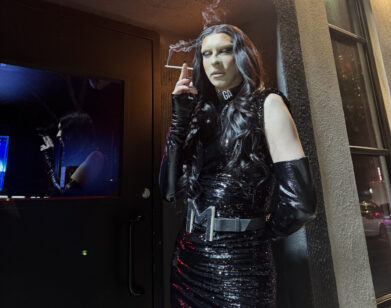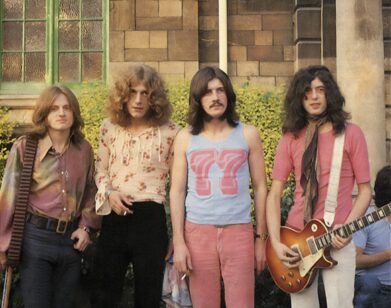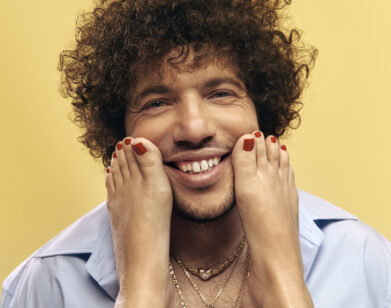Shaking Off Layers
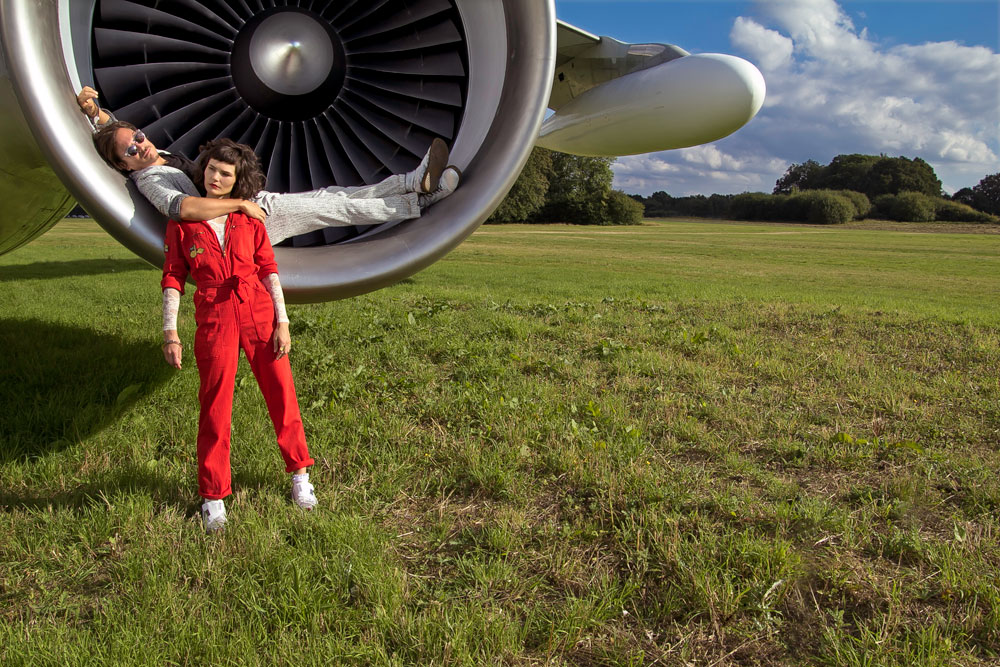
ABOVE: DAN LEVY AND OLIVIA MERILAHTI OF THE DØ. PHOTO COURTESY OF ARTHUR LE FOL.
“Now do as I say, keep your lips sealed, walk away,” sings Olivia Merilahti on top of highly produced, synthetic melodies in the first track on The Dø’s latest LP, Shake, Shook, Shaken. Merilahiti, one half of the Finnish/French duo writes lyrics, while Dan Levy produces the layering music. When they first came together in 2005, the pair created what some may argue was more
“authentic,” yet inherently experimental music, pairing guitars, a drum set, and bass with avant-garde poetic lyrics. After being backed by three different drummers, however, they have progressed toward drum machines and digitalized production, embracing refined synth and laptop-made beats.
“For me, ‘Dust It Off’ and ‘Slippery Slope’ from the second album [Both Ways Open Jaws] are direct arrows that point to Shake, Shook, Shaken. It’s continuity,” Merilhati says of the directional change.
Shake, Shook, Shaken was released in Europe last fall, but the indie pop album makes its U.S. debut tomorrow, February 10. Drawing comparisons to precursors like Björk and contemporaries such as The Knife, Blonde Redhead, and CocoRosie, The Dø have large shoes to fill, but are confidently doing so. Between shows during a sold-out tour across the U.K., Australia, and Europe this winter, we spoke with Merilahti about The Dø’s beginnings and evolutions. Merilahti was in Paris; we were in Ohio.
EMILY MCDERMOTT: I know that you and Dan first met while you were recording music for Empire of the Wolves. What made you want to work together? How did it go from producing music for the movie to forming this band?
OLIVIA MERILAHTI: I think it’s what we call a musical crush. We didn’t have anything in mind. Dan didn’t even want to work with anyone at the time. He’s a very solitary guy in the studio and I was quite young. This was my first project with a real impact. At first, we did whatever we wanted to do. We had these projects for the soundtracks and then for contemporary dance. I think the work we did for contemporary dance was exciting, because that’s where we started writing our own songs as well. And the choreographers we worked with—there was this Finnish choreographer Juha[-Pekka] Marsalo, who worked with Carolyn Carlson at the time—they definitely pushed us, maybe out of the soundtrack environment, which is a lot more constraining. Working for dance is a lot more liberating and they allow themselves a lot more. That was really important. I guess were just very complementary and we still are. That’s why it’s important to keep our differences in tact. I’m from the pop background with an obsession for melodies and focusing on the direct emotion. Dan is from jazz and contemporary music.
MCDERMOTT: Do you still work with dance and film and produce music for them?
MERILAHTI: We haven’t had a lot of projects with soundtracks and I think we would definitely work on contemporary dance if there was a good project coming up. For cinema, we’ve had some songs taken for films, but we haven’t actually scored for a while because we’ve definitely been focusing on the band.
MCDERMOTT: So with Shake, Shook, Shaken I know your sound has changed to more synthetic sounds instead of real instruments. What inspired you to make this shift?
MERILAHTI: For us it’s a continuous harmony. It’s just how it goes—what you want to do and what was done before. It’s a logical sequel to what we’ve done before. We’ve been touring a lot and we were pretty aware of the tour and the restrictions. We couldn’t have all the instruments we wanted, so we realized we could also make an album with a midi keyboard and a laptop. It kind of came out of a necessity on the road, because that was the only way we could play when it came to an emergency, and we kinda kept it that way. It’s really that live restrictions have led us to artistic desires. The drum machine, we started using as well, because we couldn’t travel with drums abroad.
MCDERMOTT: Was the creative process different when you were writing songs for this album?
MERILAHTI: There were a few differences, but the progress wasn’t that different. The difference was that the first month or first week of the creative process was sending each other ideas and demos and spending a very short time together in the studio recording songs because we wanted to have something a lot more frontal, direct, and immediate. So the time we had was quite pressured. That was different. Also, we just wanted songs to be very straight to the point, structured as well. We didn’t want to go through many different intros and outros.
MCDERMOTT: I read that you refer to your lyrics as surreal poems. Can you talk a bit about your writing process—where you come up with ideas and what that process is like for you?
MERILAHTI: It’s usually easy in the close of the week. It’s like, “Oh, wow. I have so much to write about.” Then I think the music takes over everything and the lyrics are going in the background. But when I finish touring and I come back home and suddenly everything stops, that’s the moment when I write the most. I also think I’m really inspired by movement and traveling, and obviously all that happens in between. In my imagination, they become almost like dreams. It’s a mix of images and memory and of course, traumas and shock and emotional peaks. I think for this one I tried to become the voice of the duo, not just my personal perception. I think I really wanted Dan to feel involved in this and there’s a harmony and unity that I wanted to capture. That’s why I used a lot of “we.”
MCDERMOTT: Is there a specific experience that you really felt compelled to write about?
MERILAHTI: It’s not that realistic or concrete in my head, you know? It’s really a collection of so many things that happened. “Keep Your Lips Sealed” is about censorship. It’s a moment when you realize something and can’t talk about it. It’s not so much about specific events.
MCDERMOTT: As it is ideas?
MERILAHTI: Yeah.
MCDERMOTT: What is something you and Dan have gone through together that has helped you grow in your music?
MERILAHTI: Touring is always a place where you grow. I would also mention the work we did [the producer of] the album. He’s the only one we actually worked with hand-in-hand for weeks. We spent our time in the studio with him in New York. I think there was something very strong about sharing our music with someone like him and he was just the right person. He pointed out the weaknesses of the album once in a while and he also gave us some good feedback. We had been working with just the two of us for so long that it was crucial to work him.
MCDERMOTT: How did you first become interested in music growing up? Were your parents musical?
MERILAHTI: My parents were not musical, but my mom just really wanted my brother and I to learn music as well as practice sports. It’s a balance for which I’m thankful. I’m not sure I’m more balanced than anyone, but I’m happier because I can make music and I’m really thankful for that. I started playing the cello and then the piano when I was nine. And Dan started the saxophone. He wanted to be a musician from a very, very early age. I think his dad played him free jazz when he was five, lots of that. [laughs] So, yeah, that’s how we got close with music. Then I started singing when I was a teenager. I always wanted to write songs; I just didn’t understand how someone could sing without writing their own songs.
MCDERMOTT: Do you write for yourself, like poetry, in addition to your songs?
MERILAHTI: I think I write a lot, but it’s always a continuous stream of consciousness, I guess. [laughs] It’s a mechanic. It’s a discipline and it’s a way to have supplies for the songs to come.
MCDERMOTT: Where do you look outside of music for inspiration, aside from traveling?
MERILAHTI: There’s an energy that I got inspired by from practicing a lot of sports. There’s a philosophy or some sort of courage and bravery with sports that I like to adapt to the studio life, especially for touring. It’s this courage that’s required to keep going on and not let go. Being brave is something I appreciate a lot in people usually.
MCDERMOTT: Are there figures who really stand out to you as brave and courageous?
MERILAHTI: References such as Muhammad Ali—I don’t know if he was really brave, but he was genius. I’m really, really touched by him. Somehow Ella Fitzgerald is a figure of courage. Nina Simone, obviously, and I guess, most female musicians and artists and engineers. [laughs] They’re still role models and really inspiring because, especially a few years back, it takes a lot as a woman.
MCDERMOTT: Do you ever sing in French?
MERILAHTI: English has always been my musical language. When I started writing songs when I was 13 or 14, I started writing in English because it’s the language in between. I speak Finnish, I speak French, so I’ll write songs in English because that’s the music I listen to. I learned so much poetry and the poetic way of expressing myself is in English.
MCDERMOTT: Would you ever consider French or Finnish?
MERILAHTI: [laughs] It might happen someday. I’d like to make that happen, but I’m just very clumsy with the French language and singing in French, so I guess I’ll be collaborating with bands that I like at the moment that do it very well, especially a band called La Femme who write these surreal poems. I really like their lyrics. Maybe they’ll write a song for me.
MCDERMOTT: How would you describe your philosophy toward music?
MERILAHTI: I’m very concerned with the healing process of a song and music in general. I think that’s why I make music—it heals me and I’m extremely sensitive to people who tell me that this or that song made them feel better or helped them go through a difficult time in their life. I think that music is almost medicine. I don’t know if that’s my philosophy, but that’s my thought process.
SHAKE, SHOOK, SHAKEN WILL BE RELEASED IN THE U.S. TOMORROW, FEBRUARY 10 VIA SIX DEGREES RECORDS. FOR MORE INFORMATION, VISIT THE BAND’S WEBSITE.

